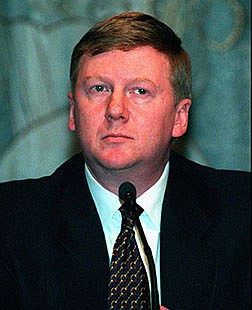Anatoly Chubais, one of the economic reformers in the years after the Soviet Union and author of Russia's unpopular privatization program, quit as presidential envoy on sustainable development, the Kremlin confirmed Wednesday, after reports that he left the country because of his opposition to Russia's war on Ukraine.
Chubais, the most senior official to cut ties with the Kremlin after the invasion of Ukraine, was one of the few 1990s Russian reformers who stayed on throughout Putin's presidency.
Chubais was not a member of Putin's dwindling inner circle of hard-line security and military chiefs, known as the siloviki, or men of power.
Kremlin spokesman Dmitry Peskov said Chubais had resigned but did not confirm he had left the country. "Yes. Chubais resigned of his own free will. But whether he left or did not leave, that's his business," Peskov told reporters.
Ruslan Edelgeriev, President Vladimir Putin's representative on climate issues, also confirmed Chubais' resignation in comments to RIA Novosti.
Tass news agency reported that Chubais had left Russia, while Kommersant newspaper published a photograph of him withdrawing cash from an automated teller machine in Istanbul. The Bloomberg News agency, which first reported the news, reported he had departed Russia because of his opposition to Putin's war.
Chubais' wife, Avdotya Smirnova, signed an open letter from philanthropists to Putin last month opposing the war.
In the early 1990s, Chubais was part of a team of reformers associated with economist Yegor Gaidar, the latter who served as deputy prime minister and finance minister but stepped down before the loans-for-shares deal.
Last week, Chubais, 66, posted a post on Facebook to commemorate Gaidar's death in 2009. He said he had been wrong about the strategic risks faced by Russia, an apparent reference to the nation's current direction under Putin.
Chubais said it seemed "an entire era" had passed since Gaidar's death.
"In our discussions about the future of Russia, I did not always agree with him. But it seems that Gaidar understood the strategic risks better than I did, and I was wrong," Chubais wrote.
He recently posted a tribute on his Facebook page to Boris Yeltsin. On Feb. 27 on Facebook, Chubais marked the anniversary of the death of prominent pro-democracy politician Boris Nemtsov, who was gunned down near the Kremlin in 2015 after harshly criticizing Putin's annexation of Crimea from Ukraine. (Facebook and Instagram have both been blocked in Russia and a Moscow court Tuesday banned parent company Meta as an "extremist" organization.)
Chubais reportedly gave Putin his first Kremlin job in 1997 and supported his rise to power in 1999.
In 2008, Chubais was appointed to the Russian Nanotechnology Corp., a state nanotechnology firm that was supposed to develop cutting edge technologies, later renamed Rosnano. Chubais was dismissed in December 2020 amid friction over unprofitable projects and inefficiency. Instead Putin created a role for him as envoy on sustainable development.
